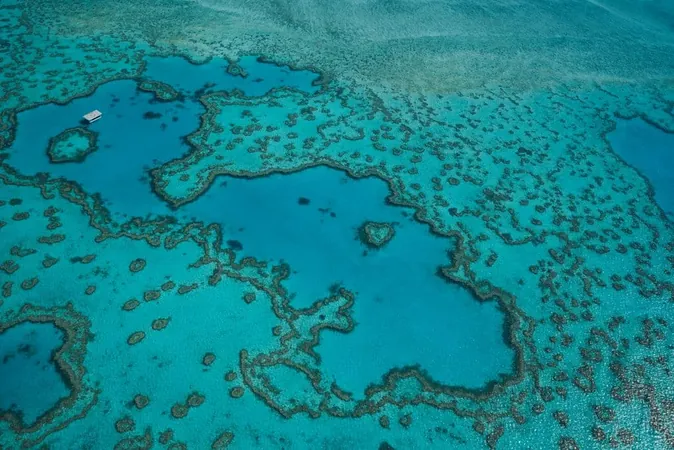
Catastrophic Bleaching Crisis Strikes Southern Great Barrier Reef – Is It Too Late to Save It?
2025-01-22
Author: Sarah
Introduction
The Southern Great Barrier Reef is facing an unprecedented crisis. A new study conducted by a team of Australian scientists has revealed that heat stress in 2024 led to severe coral bleaching, marking levels previously unrecorded and resulting in catastrophic damage to the reef's ecosystem.
Research Findings
The alarming findings come from an extensive research project that monitored the health of 462 coral colonies around One Tree Island, a protected coral cay in southern Australia. The research, carried out over 161 days between February and July, uncovered that over 44% of the monitored corals perished due to this mass bleaching event. Remarkably, some coral species, particularly Acropora, faced staggering mortality rates of up to 95%. Only a mere 92 colonies escaped the ravages of bleaching entirely.
Previous Events
This recent bleaching incident is the seventh significant event to impact the Great Barrier Reef since 1998, and the fifth since 2016. Scientists have termed this outbreak as “the most widespread and catastrophic,” indicating a troubling trend for the world’s largest coral reef system.
Causes of Coral Bleaching
Coral bleaching occurs as a direct response to rising ocean temperatures, which cause the algae living in symbiosis with corals to flee. This expulsion strips the corals of their vibrant colors and jeopardizes their survival. While bleaching does not immediately kill corals, the increased frequency and intensity of heat stress events leave them more susceptible to diseases and greatly impair their recovery and reproductive abilities.
Expert Opinions
Maria Byrne, a marine biologist at the University of Sydney, described the situation as "really devastating" and expressed her frustration at the ongoing climate crisis. "We have been trying to get the message across about climate change for ages," she stated, highlighting the urgent need for awareness and action.
Co-author Ana Vila Concejo emphasized that the study should serve as a wake-up call for policymakers and conservationists. “The resilience of coral reefs is being tested like never before, and we must prioritize strategies that enhance their ability to withstand climate change,” she noted.
Global Consequences
With alarming predictions, a study conducted in August warned that unless immediate and concerted global action is taken, this generation may witness the demise of the Great Barrier Reef. This warning comes as researchers analyze sea surface temperature trends, revealing that extreme ocean heat recorded in recent years is among the highest in 400 years. Such temperatures pose an "existential threat" to the reef's ecosystem, raising concerns about potential near-annual coral bleaching events that could further diminish its ecological significance.
The Great Barrier Reef's Significance
The Great Barrier Reef, located off the coast of Queensland, spans approximately 344,400 square kilometers (133,000 square miles), exceeding the combined area of the UK and Ireland. It is celebrated for its rich biodiversity, housing thousands of marine species. However, according to the Australian Institute of Marine Science, about half of the reef's coral cover has been lost since 1995, with recent bleaching events intensifying due to climate-altering extreme weather patterns.
Current Global Coral Bleaching Event
Moreover, the world is presently enduring its fourth global coral bleaching event. As reported by the US National Oceanic and Atmospheric Administration (NOAA) and the International Coral Reef Initiative (ICRI), the current crisis affects over 50 countries, including Australia and several Central American nations, marking it as the largest event in recorded history.
Economic and Ecological Importance
Coral reefs are vital ecosystems that support at least 25% of marine species and provide essential services valued up to $9.9 trillion annually. Often referred to as the "rainforests of the sea," they act as crucial carbon sinks, mitigating the impacts of climate change.
Urgent Call to Action
The latest report from the Global Coral Reef Monitoring Network (GCRMN) reveals a stark reality: the world has lost approximately 14% of its coral since 2009, underscoring the urgent need for global conservation efforts.
As this pressing crisis unfolds, experts warn that immediate action is imperative to safeguard one of our planet’s most cherished natural wonders. Will we rise to the challenge and take meaningful steps to preserve the Great Barrier Reef for future generations? The clock is ticking!


 Brasil (PT)
Brasil (PT)
 Canada (EN)
Canada (EN)
 Chile (ES)
Chile (ES)
 Česko (CS)
Česko (CS)
 대한민국 (KO)
대한민국 (KO)
 España (ES)
España (ES)
 France (FR)
France (FR)
 Hong Kong (EN)
Hong Kong (EN)
 Italia (IT)
Italia (IT)
 日本 (JA)
日本 (JA)
 Magyarország (HU)
Magyarország (HU)
 Norge (NO)
Norge (NO)
 Polska (PL)
Polska (PL)
 Schweiz (DE)
Schweiz (DE)
 Singapore (EN)
Singapore (EN)
 Sverige (SV)
Sverige (SV)
 Suomi (FI)
Suomi (FI)
 Türkiye (TR)
Türkiye (TR)
 الإمارات العربية المتحدة (AR)
الإمارات العربية المتحدة (AR)